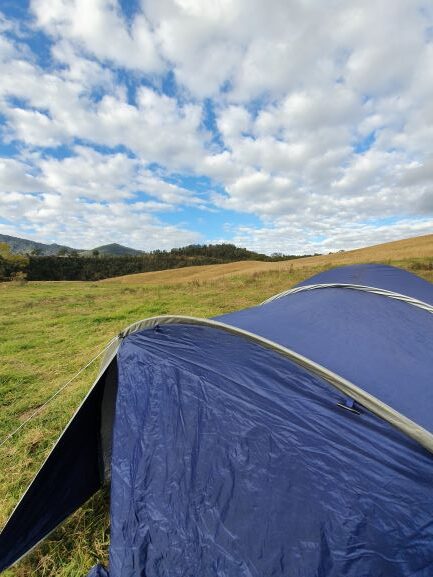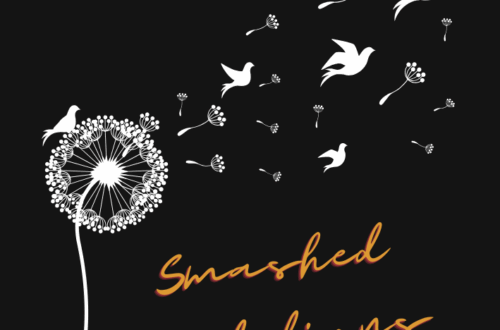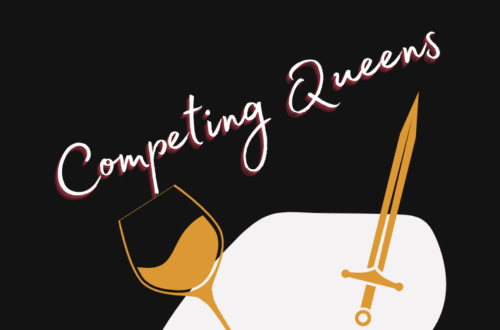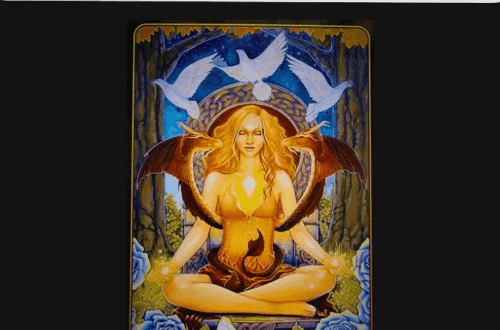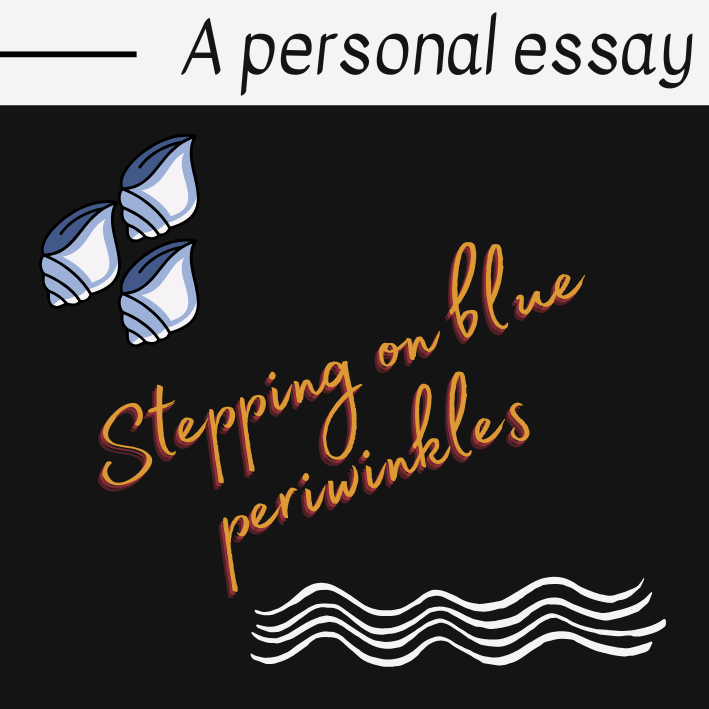
Stepping on Blue Periwinkles
I’m a camper. With just those three words you’ve probably already created a mental picture of me. Much of what you imagine is probably true. I’m not much into fashion and my make-up takes about five minutes to apply. I don’t own a hair dryer or a hair straightener, and more often than not I wear sensible shoes. I guess that goes to show that stereotypes exist for a reason. Lost in those stereotypes though are actual people. People we might have something in common with: a favourite book; a favourite band; a place we’ve lived; a place we love. It could be lots of things. I know this and yet I tend to hide myself away. I sense that I shouldn’t be like this, but I still am.
I am more comfortable out in nature on a rainy day than I am in a room full of people, regardless of how nice the people might be. I often wonder if that is wrong and I wish I was different. Unfortunately it doesn’t bother me enough to force me to change. And, recently I discovered I’m not alone in my love of the outdoors, so that adds to my complacency. In the most recent Australian Bureau of Statistics data, survey results show that 52% of Australians over eighteen visited a World Heritage Area, or a National or State Park in the previous year[1]. My friends aren’t amongst them. They all think it’s crazy that I like to go camping in winter. Judging by the low patronage at the campgrounds in the cooler months, other people agree with them. That suits me fine. I am free to enjoy the thermal properties of red wine and a campfire without having to listen to the night time activities of other campers and I escape the happy yet vocal family groups. People that go camping with generators and televisions and noisy kids don’t tend to venture out in winter. Neither do mozzies and flies. Often it feels like it’s just me, my husband, our dog, and acres upon acres of nothing resembling the suburbs.
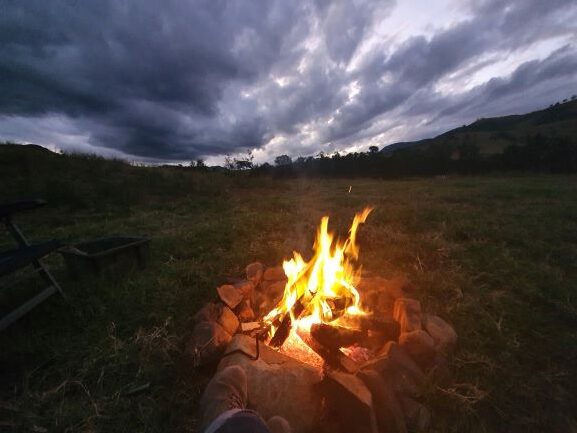
When I was young we picnicked more so than camped. Picnics seemed to be our family thing. When I say family, it was usually just me, my Mum and my stepdad Ken. I have no idea where my brother was at the time. Not just during those outings but my whole childhood really. I was going to say that isn’t relevant, but I guess somehow it is.
On the picnics we had on the sand at Clontarf overlooking Middle Harbour, I am sure I probably built sandcastles and collected shells, although that isn’t what I remember. Instead I remember trying not to step on the blue periwinkles as I clambered over the rocks. Those tiny snails may have been no bigger than my little fingernail, but it hurt like hell if you trod on them. I also remember pushing on the side of the cunjevoi. I loved that my touch could make them spurt water so I prodded those poor inert sea squirts relentlessly. While I entertained myself, Mum and Ken ate chicken specially bought from Coyles at Dee Why and drank red wine from pottery wine goblets. Those goblets were a constant at all our picnics. Mum always wrapped them carefully in a tea towel. I’ve tried to find my own set but so far I haven’t been successful. I have followed other traditions though.
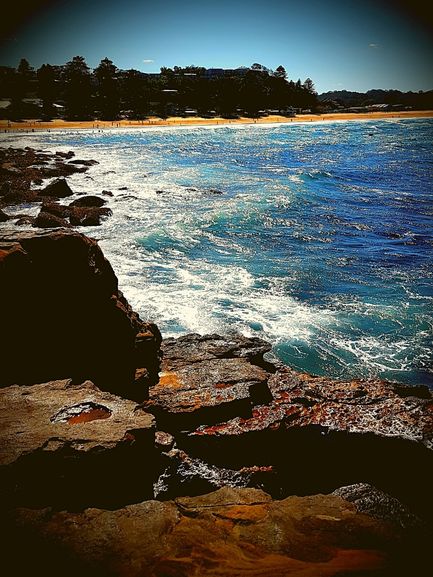
As an adult I like to go and sit on “my rock” at Avoca Beach. I position myself at the furthest point because I like to watch the water as it comes crashing in on either side of me. Sometimes the spray gets me but most of the time I feel safe from the churning water below. I like that feeling. It encourages me to sit and consider the things that exist beneath the surface.
To my right the rocks are covered in barnacles. I stare at them often. Barnacles encrust themselves permanently to something solid so day after day things stay pretty much the same for them. What a life. Sometimes their lifestyle appeals to me. Other times I thank God I’m not a barnacle.
In the cooler months we had family picnics in the bush. I clambered over the rocks on those outings too. Mostly I spent time on my own while Mum and Dad drank wine and read books. As far as I remember we were all content. I loved the nature soundscape. I still do. The call of the Eastern Whipbird is synonymous with the Australian bush for me even though for a long time I couldn’t name them. And, rarely did I see them. Then I didn’t know what I was looking for; now I do.
I am fortunate that now an entry point to Brisbane Waters National Park is not far from the end of my street. I used to take advantage of that whenever I could. I’d walk the kids to school and then I’d venture off into the bush with my notebook, a pen, and some water. Some days I would walk for hours. Other times I just looked for a secluded spot. I’d find a rock and then settle in to write or draw the day away. Sometimes I would take a book with me too. On occasion I would just sit and do nothing.
I was never lonely when I was in the bush. I am never lonely on my rock at Avoca either. In fact I am rarely lonely when I am on my own.
I do remember two family camping trips. On the first trip I would have been in primary school, aged maybe nine, maybe ten. We stayed on the Marini’s farm at Gloucester. My brother came on that trip. So did his friend Anthony. During the day we skipped stones on the river and at night we sat around a campfire. It was great except for the morning I ran away from the snake. I can’t tell you what type of snake. It was a snake — that was all I needed to know — and it and I had headed in the same direction. I think everyone in Gloucester heard my screaming. Mum, Ken and Allan laughed. I didn’t then but I do now.
The second camping trip we took as a family was without my brother. Mum, Ken, my now husband Adrian, and I did a three day packsaddle ride through the Blue Mountains National Park. It was Mum and Dad’s Christmas present to us. I can’t recall a better present. Mum and I sat around the campfire smoking and talking while our guide prepared our meals. We gathered firewood, we saw a platypus and a lace monitor, and best of all, we spent three days on horseback. This is a memory I will cherish forever. All of us were riders except Adrian. He said he had a good time all the same and the bruises on his inner thighs did fade in time. Horses united us; they’re special creatures.
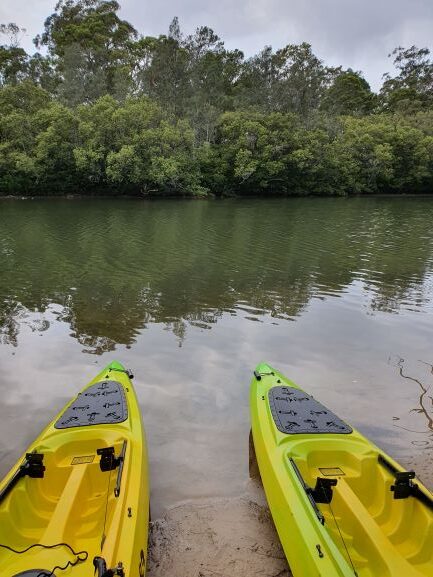
Adrian and I leave the land behind sometimes too. Kayaking is yet another way we escape into nature. It is my solution to the increased risk of snake encounters in summer. Rather than heading out onto open stretches of water we prefer to paddle up small creeks. This way we get to explore places most people can’t access. We call it bushwalking on water. On our paddles we see lizards basking on rocks, various waterbirds feeding, brightly coloured Azure Kingfishers darting about, and fish — lots of fish. I try to forget that things called bull sharks exist. If I don’t see something with my own two eyes, is it really there? More to the point, if I don’t remember things from my past do they actually exist for me?
I remember reading. I remember writing. I remember picnics and camping. I can even remember pre-Ken days at Collaroy. But my memories of my brother are scant. I have no idea why. I rang him to see if he could help me make sense of things. What I discovered is that more information creates more questions. It doesn’t provide answers. We both remember visiting members of Dad’s family growing up but that’s about it. He’s surprised I don’t remember our homes at Seaforth, Cromer, and Dee Why West. I’m not, I was a young child. But I am stunned that he sees things the way he does. He remembers the wrongs people committed; I remember people’s animals.
My cousins had Pierre the standard poodle and then Ziggy the toy poodle. My other cousins had Dino. As soon as my brother said his name, I could see him so clearly. At the time I was too young to know he was an Irish Red Setter cross Labrador. Aunty Jean, my Dad’s sister who we visited occasionally on our way through from Manilla to Sydney had a blue cattle dog.
Growing up Mum made sure I always had pets and I have maintained the tradition. I’ve had cats: Brownie, Kitty, Yum-yum, Chi-chi, Intrepid, Bindi, Meggsy, Smokey, Monty, Dapper, Luke, Switch, and Manny. I still have Oz and Leia. We also had dogs. With Mum I had Afghans: Sasha first and then Sheba and Delilah. Adrian and I have had Bojay, Gemma, Dharma and Bowie. Now we have Asher. I’ve also had horses. My horse was called Opium. Mum had Tamara and the foal, Dad had Saphira, and we were given Matey by my old boss at Boonaroo Riding School. I often wish I’d never left that job. Animals have been my saviour. People die and I cry. Animals die and I am inconsolable.
I asked Allan if he feels a sense of place. He doesn’t. The house Mum and Dad built in Manilla is the closest thing he has. He lived there – I didn’t. Neither did he past the age of five. My brother sees himself as a country boy yet he doesn’t like camping because he doesn’t like the dirt. He likes five star accommodation. We are as different as we are alike. We are both a product of the same family and yet our memories seldom concur. He’s honest with me and I appreciate that. He has no sense of family so he has no desire to be a part of mine now. I still invite him to Christmas each year even though I know he’ll decline the invitation. We don’t fight. We don’t do anything. We live the lives we’ve chosen. Would I be happier if I stopped trying to be my brother’s sister? Maybe. Would I be happier if I stopped trying to be lots of things I feel obligated to be? Probably.
I am most at home in nature. There I find a sense of consistency that doesn’t always exist in everyday life. Nature is whatever it is — nothing more, nothing less. I doubt the barnacle spends too much time pondering its existence and I’m guessing trees just spend their time being trees. I don’t imagine too many apple trees wish they were gum trees or vice versa. And I’m pretty sure that who I am, what I do, how old I am, or what I look like is of little interest to a bull shark. If it’s hungry and mistakes me for prey it will attack. Otherwise it will leave me alone. In nature I am just another critter trying to get by. We mean each other no harm.
In fact, scientists are now acknowledging what many of us already know — spending time in nature can make us feel better. British economics lecturers, George MacKerron and Susana Mourato, conducted research via a smart phone app called “Mappiness” to explore the connection between subjective well-being and an individual’s physical location. Based on over one million responses, gathered from over twenty thousand participants, they concluded that people “are significantly and substantially happier in all green or natural habitat types than in urban environments.” [2] In other research American and Canadian psychologists explored whether time spent walking in nature could benefit people with Major Depressive Disorder (MDD). Their results indicated that it could. Even though people were instructed to focus on negative memories prior to taking their nature walk their moods improved, as did their working memory capacity.[3] These results were replicated in a 2015 study. This new research also found that time spent in nature could reduce negative rumination and anxiety.[4] And, it just keeps getting better. A further study indicated that walking in nature made people feel more alive, more enthusiastic, and more energised.[5] All this research suggests my need to escape urban life isn’t as much of a problem as I have let myself think. If anything I probably should be doing it more.
Besides, Adrian and I love to go camping. We don’t have pottery goblets but we do always take a couple of bottles of red.
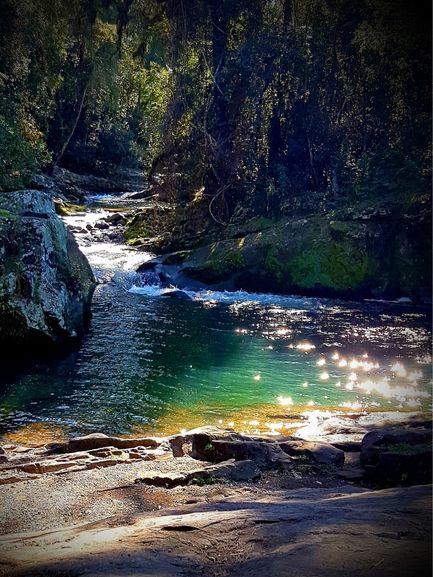
A few camping trips back we decided to go to White Rock in the Chichester State Forest. It seemed perfect. Only a three hour drive from our home on the New South Wales Central Coast, it was picturesque, dog friendly, and it had a pit toilet. A drunken night-time pee in the middle of a thistle patch means that I’m now a bit precious when it comes to toileting facilities so the inclusion of the toilet was essential.
From the start White Rock wasn’t my definition of an ideal location. The height of the trees limited the sunlight and the ground remained damp as a result. A car had already secured the only position that afforded water views so we had to settle for water sounds instead. All day I kept wishing we had their spot. It turned out that “they” was a lone “he” and I came to wish that we had never shared the same campground.
The next day we discovered that the towels placed over the car windows hid something that I would rather have not become privy to. In that idyllic spot overlooking the river this man had filled the back of his car with coals and said good bye to the world.
This isn’t as unusual as it might sound. When charcoal burns it increases the concentration of carbon monoxide. So, as he sat overlooking the river with the coals burning behind him, the elevated levels of carbon monoxide would have gradually reduced the ability of his blood to deliver oxygen to his body. The result – death by hypoxia due to carbon monoxide poisoning.
Statistics suggest that men tend to commit suicide by more violent means than women[6], so his choice was statistically unusual. How easy it is to forget that those statistics are made up of real people: other people’s wives, mothers, daughters, sisters, fathers, husbands, sons and brothers. Maybe even people you know. Within those numbers is a hell of a lot of shared pain.
I wonder if he thought about the people that would discover him. I wonder if he knew the impact it would have on a random stranger’s life. Did he really think his family would be better off without him? I guess he wasn’t thinking outside his own pain. From that point on he forced me to think outside my own.
When we got home I saw the missing person plea on Facebook. I looked on his face and the face of his wife and children. I read the comments of those that knew him and those that just felt sympathy for the family. It took three days for his wife to notify people he’d been found. I knew because I checked her Facebook more regularly than your average stalker. I became obsessed with a man that I didn’t know. I wanted to find evidence that his life sucked. I couldn’t. All I found was evidence of a family man that on occasion would take off into nature to escape the world for a while.
I saw his face. I felt his pain. I fell apart. I just kept wondering what the hell went wrong.
I’m scared of heights and enclosed spaces and bull sharks and snakes and a plethora of other things. But suddenly, for the first time in my life, I was petrified. What happens if I lose the ability to find my peace in nature? Then I realised things aren’t all about me. Pain is like energy. It can’t be destroyed. Permanently taking away his pain didn’t make the pain go away. It was just passed on for others to deal with. I needed that realisation.
I am one of the lucky ones. My experience in Chichester State Forest stopped me from glorifying death. And fortunately, after a few months, I came to realise that just because something no longer provided comfort for someone else doesn’t mean it can’t still do so for me. The opposite is also true. My place might well be somebody else’s idea of hell. That’s okay. It’s my place.
Whether my childhood created me or I created myself from, and through, my lived experiences is — and always should be — irrelevant. The one thing I know for sure is this. Rather than seeing myself through the lens of my upbringing and the expectations of others I need to be comfortable living the life I choose, the life I know, and the life I love. I would like to name the man we found that day, but I know it isn’t my place to do so. I want to keep him alive but I don’t have that right. His Facebook profile has been taken down and I can’t see photos of him on his widow’s page anymore. It unnerves me that he no longer exists. Something tells me that’s a good thing. We already have enough in common.
[1] Australian Bureau of Statistics, 4172.0 – Arts and Culture in Australia: A Statistical overview, 2007
[2] MacKerron and Susana Mourato, “Happiness is greater in natural environments,” Global Environmental Change, (2013) Vol 23. Pp 992-1000.
[3] Berman, Marc G, Ethan Kross, Katherine M Kipan, Mary K Askren, Aleah Burson, Patricia j Deldin, Stephen Kaplan, Lindsey Sherdell, Ian H Gotlib and John Jonides, “Interacting with nature improves cognition and affect for individuals with depression,” Journal of Affective Disorders (2012) Vol 140. Pp 300-305.
[4] Bratman, G N, Gretchen C Daily, Benjamin J Levy, and James J Gross, “The benefits of nature experience: Improved affect and cognition,” Landscape and Urban Planning (2015) Vol 138. Pp 41-50.
[5] Ryan, Richard M, Netta Weinstein, Jessey Bernstein, Kirk Warren Brown, Louis Mistretta, and Marylene Gagne, “ Vitalizing effects of being outdoors and in nature,” Journal of Environmental Psychology (2010) Vol. 30. Pp159-168.
[6] Denning, D G., Y Conwell, D King and C Cox, “Method choice, intent, and gender in completed suicide,” Suicide Life Threatening Behaviour, (2000) Vol 30 Iss 3. Pp 282-288.


